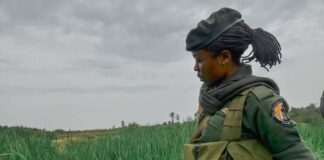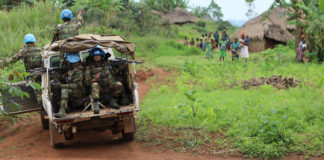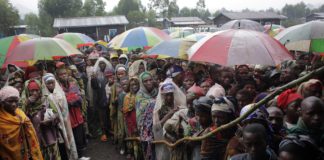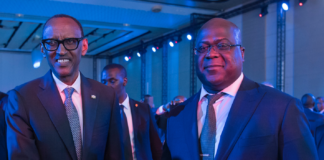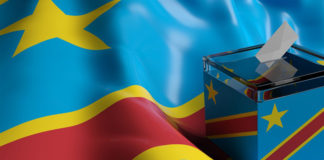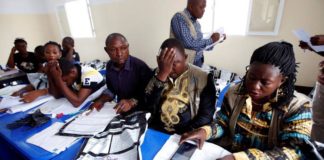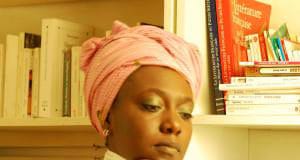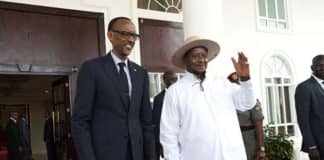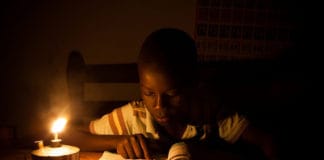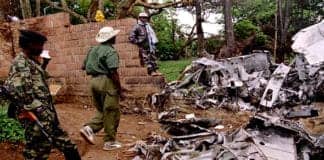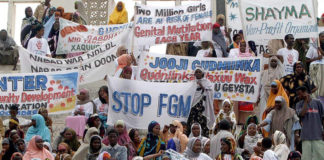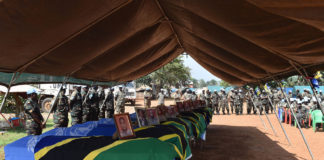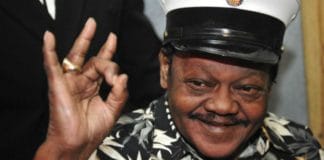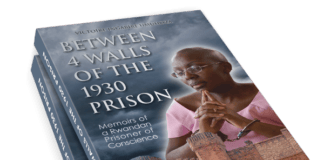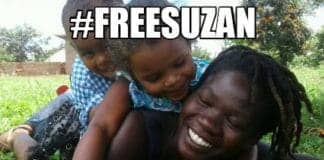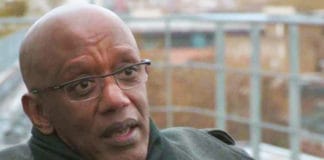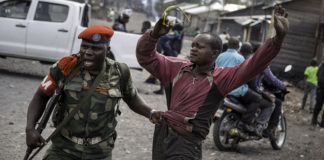Tags Uganda
Tag: Uganda
DRC’s Virunga: Park, gorillas and rangers all under attack
The most violent and threatening predators are both foreign and native actors who want to get the rangers, people and wildlife, especially the gorillas, out of the way to ransack the park’s resources.
Should UN peacekeepers leave the Democratic Republic of Congo?
The UN troops in DRC are called “peacekeepers,” but MONUSCO’s real mission is managing the “silent violence” in which perpetrators cannot be readily identified, atrocities go unreported, and resources are smuggled out of DRC through Rwanda and Uganda.
Foreign aid for Rwanda, suffering for Rwandans and Congolese
Asked how Kagame fits all the money gained by plundering Congo’s immense resources into his budget, David Himbara, a former member of Kagame’s cabinet, replied, “DR Congo money does not go into the Rwandan economy. The loot goes into offshore accounts of Crystal Ventures Ltd and its owner, Kagame.”
Paul Kagame and his house Negro, Félix Tshisekedi
The Congolese are under occupation by Rwanda. Congo’s immense mineral resources have been plundered by Rwandan and Ugandan troops, then smuggled or sold to Western and transnational corporations.
DR Congo post-election: An interview with Maurice Carney
On New Year’s Eve, the people of the Democratic Republic of the Congo (DRC) went to the polls to choose their next president, parliament and provincial governments. I spoke to Maurice Carney, executive director of Washington, D.C.-based Friends of the Congo, about the results.
Code talking: UN Security Council on war and peace in DRC
Most UN Security Council (UNSC) meetings are so stuffy that they’re hard to watch without wishing someone would open a window, turn on the ventilator or take the august ambassadors off life support. Norman Finkelstein couldn’t have been more apt than when he called Secretary General Ban Ki-moon a “comatose puppet of the United States.” I went through an entire pot of strong coffee just listening to last week’s three-hour UNSC meeting about the Dec. 30 election in the Democratic Republic of Congo (DRC). The ambassadors spoke in code, without naming key players and perpetrators.
Congo in the abyss
On Feb. 12, 2018, the UN High Commissioner for Refugees reported that there were 4.49 million internally displaced persons (IDPs) in the Democratic Republic of Congo and 630,500 refugees in neighboring countries. The IDP population had nearly doubled in the previous year alone, mainly as a result of clashes and armed attacks. This week I spoke to Swiss Congolese historian and activist Bénédicte Kumbi Ndjoko about recent developments in the Democratic Republic of the Congo.
Paul Kagame’s paranoia strikes deep
He’s the president of Rwanda and the current president of the African Union, feted by the Brookings Institute, one of the most venerable ideological pillars of U.S. capital interests. So why is Paul Kagame manifesting more and more signs of paranoia? Let’s consider just a few possibilities: Assassination rumors, insurgency, political prisoner Victoire Ingabire, 7,000 Rwandan churches and mosques shut down.
Nuclear power in Africa?
Rosatom – Russia’s state nuclear energy corporation – has recently signed Memorandums of Understanding (MOUs) with a number of African nations to build nuclear power plants within their borders. I spoke to David Himbara, a professor of international development and African energy activist, about the likelihood of Rosatom actually building these nuclear plants. Currently, Sub-Saharan Africa faces an extraordinary level of energy poverty.
The crime that turned Central Africa into a vast killing ground
April 6 was the 24th anniversary of the day that Gen. Paul Kagame shattered a ceasefire agreement and resumed the 1990-1994 war in Rwanda by assassinating Rwandan President Juvenal Habyarimana and Burundian President Cyprien Ntaryamira. His troops, acting on his orders, fired a rocket at Habyarimana’s plane when it appeared overhead in Rwanda’s capital, Kigali, returning from Dar es Salaam, Tanzania.
America, Uganda and the War on Terror – a book review
Helen Epstein’s new book, “Another Fine Mess: America, Uganda, and the War on Terror,” is dense with detailed and fascinating accounts of events in Ugandan history and politics and those of neighboring nations. I’m familiar with much of it, but there’s also much I hadn’t known, some I disagree with, and elaborations or different interpretations of what I’ve previously read or been told.
Africans organize to end the widespread practice of Female Genital Mutilation
Feb. 6 is the international day for the abolition of all kinds of female genital mutilation and cutting. The practice of FGM/C in Africa and the Middle East is a thousand-year-old tradition consisting in cutting the clitoris of baby girls, teenagers and women with a razor blade or an ugly special knife. While the exact number of girls and women worldwide who have undergone FGM/C remains unknown, at least 200 million girls and women in 30 countries have been subjected to the practice.
Uganda attacks Congo’s Beni Territory just in time for Christmas
The Congo crisis is now one of the greatest humanitarian emergencies in the world and the most underreported. An average of 5,500 people a day flee violence and insecurity, even more than in Iraq, Syria, and Yemen. Unlike Iraq, Syria, and Yemen, however, the Congo wars are undeclared and there’s no front line. There are instead many wars over many concentrations of resource wealth in this immensely resource-rich country, especially in the eastern provinces.
ISIS of Central Africa a new cover for plundering Congo
A video calling for an Islamic State jihad in the Democratic Republic of the Congo appeared online and in a few news reports last week. It was purportedly made in Beni Territory, within Congo’s North Kivu Province, where a phantom so-called Islamist militia, the Allied Democratic Forces, has been blamed for massacres of the indigenous population that began in October 2014. I asked Boniface Musavuli, a native of Beni and author of “The Massacres of Beni: Kabila, Rwanda, and the Fake Islamists” to help contextualize the so-called news.
Wanda’s Picks for November 2017
We pour libations for Fats Domino, New Orleans musical legend, who died Oct. 24. He was 89. The Architect of Rock n’ Roll was the child of Haitian Kreyòl plantation workers and the grandson of an enslaved African. And we also pour libations for Dennis Banks, co-founder of the American Indian Movement (AIM), who made his transition Oct. 30. He was 80. Congratulations to Drs. Vera and Wade Nobles on their 50th wedding anniversary this month.
Ingabire Day: We are all Victoire and Victoire is all of...
Oct. 14 marked the seventh anniversary of Rwandan political prisoner Victoire Ingabire’s arrest shortly after she attempted to run for president against Rwanda’s military dictator, President Paul Kagame. The Brussels-based International Women’s Network for Democracy and Peace commemorates Oct. 14 as Ingabire Day, a day of solidarity with Victoire Ingabire and all political prisoners. I asked Claude Gatebuke, Rwandan genocide survivor and founder of the African Great Lakes Action Network, to explain Victoire Ingabire’s message.
Solidarity Uganda: Rural Ugandans resist land grabbing and US-backed dictatorship
Eighty-four percent of the population of Uganda are rural subsistence farmers. They are resisting both rampant land grabbing and U.S. ally Gen. Yoweri Museveni’s attempt to rule for life. I spoke to Phil Wilmot, an American-born activist who now lives in rural Uganda. Land grabbing is one of the manifestations of dictatorship in northern Uganda. In 2012, we started Solidarity Uganda to resist evictions and land grabs.
Rwanda, Paul Kagame’s economic mirage: an interview with David Himbara
The 1994 bloodbath in Rwanda also became an argument for the suppression or even criminalization of speech. No one makes these arguments more fiercely and absolutely than Rwandan President Paul Kagame. Kagame claims to have inspired Rwandans to rise from the ashes to build an economic miracle and example for all Africa. In a new book, however, economist David Himbara says that Kagame’s economic miracle is in fact an economic mirage. I spoke to David Himbara.
Fifty-five years after Lumumba’s assassination, Congolese see no relief
One of the most devastating U.S. interventions was the overthrow of the democratically elected leader of the Congo, Prime Minister Patrice Emery Lumumba, in 1960. That overthrow has been devastating for the Congolese people, because not only did the U.S. overthrow and assassinate the democratically elected leader, but they also imposed a dictatorship on the Congolese people for over three decades, and it has crushed and destroyed the country and the people.
Congolese youth look to chart a new path in the heart...
The path forward for many Congolese youth is clear. They want to be free from tyranny more than the Kabila regime wants to repress them and deprive them of their God-given life pursuits. In the Congo, the youth are prepared for a sustained civil disobedience undertaking to cripple and ultimately remove an oppressive system that not only kills them but also squelches their aspirations and hopes for a dignified life.




